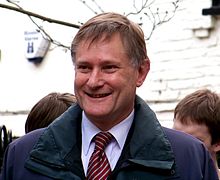Hugh Bayley
Hugh Bayley | |
|---|---|
 | |
| Member of Parliament for York Central | |
| Assumed office 6 May 2010 | |
| Preceded by | Constituency established |
| Majority | 6,451 (13.9%) |
| Member of Parliament for City of York | |
| In office 9 April 1992 – 6 May 2010 | |
| Preceded by | Conal Gregory |
| Succeeded by | Constituency abolished |
| Personal details | |
| Born | 9 January 1952 Maidenhead, Berkshire, England |
| Political party | Labour |
| Spouse | Fenella Jeffers |
| Alma mater | University of York |
Hugh Bayley (born 9 January 1952) is a British Labour politician. He was the Member of Parliament for the City of York from 1992 until the constituency was abolished in 6 May 2010. He was subsequently elected to represent the successor constituency York Central.
Early life
Bayley was born in Maidenhead, Berkshire and was educated at Haileybury and Imperial Service College, the University of Bristol, where he obtained a Politics BSc degree in 1974; and the University of York where he was awarded a BPhil degree in Southern African Studies in 1976. After his studies in 1975 he became a District Officer and later a National Officer with NALGO until 1982.
He was elected as a councillor in the London Borough of Camden in 1980. He became the General Secretary of the International Broadcasting Trust in 1982. Bayley stepped down as a councillor and moved to York to take up a post as Research Officer in Health Economics at the University of York from 1987-92. He was a lecturer in Social Policy at the University from 1986 until 1998.
Parliamentary career
Hugh Bayley was nominated as the Labour candidate for York at the 1987 General Election but was defeated by just 147 votes by the Conservative Conal Gregory. After the election, Hugh Bayley became a Health Economics Research Fellow at the University of York, and became a member of the local health authority.
Conal Gregory and Hugh Bayley again fought it out at the 1992 General Election in York and this time Bayley won by a comfortable margin. After his election he made his maiden speech on 7 May 1992 and joined the Health Select Committee. The name of the York constituency and its boundaries were changed and Bayley won a majority of over 20,000 at the 1997 General Election.
After the election, Bayley became the Parliamentary Private Secretary to the Secretary of State for Health Frank Dobson who lived near York, and was promoted to Tony Blair's government in 1998 as the Parliamentary Under Secretary of State at the Department of Social Security. He was dropped from government after the 2001 General Election. He has since served on the International Development Committee. He is Chair and founding member of the Africa All Party Parliamentary Group, Chair of the Parliamentary Network on the World Bank and chairs the Economics and Security Committee of the NATO Parliamentary Assembly. He is also a Chairman of Public Bill Committees. The City of York constituency was abolished in 2010, with Bayley being elected in the 2010 General Election to represent the successor constituency York Central.
He is a loyal backbencher, rarely voting against his party[1].
At the outset of the 2010 parliament, Speaker of the House of Commons John Bercow appointed Bayley as a temporary Deputy Speaker to serve for two weeks until the election of Deputy Speakers[2]. Bayley accepted the appointment, but stated that he would serve only temporarily and would not run for a Deputy Speakership, as he preferred to be able to represent his constituents by speaking out on issues before the House[3].
Personal life
He was active in the Anti-Apartheid Movement in his student days and is a lover of jazz. On 22 December 1984 in Camden, he married Fenella Jeffers from St Kitts. They have a son (born November 1985) and a daughter (born December 1987).
References
External links
- official site
- Guardian Unlimited Politics - Ask Aristotle: Hugh Bayley MP
- TheyWorkForYou.com - Hugh Bayley MP
- BBC Politics page
